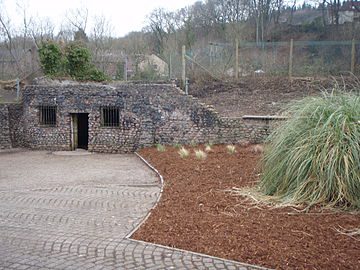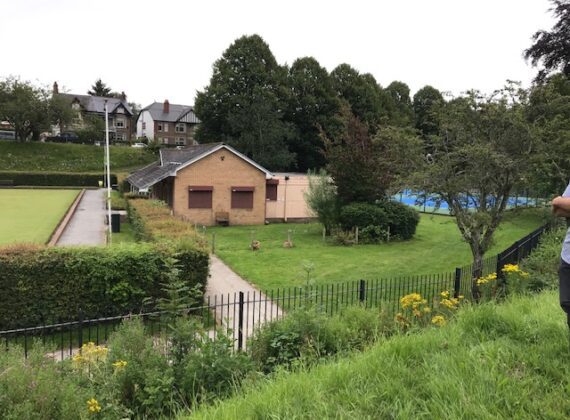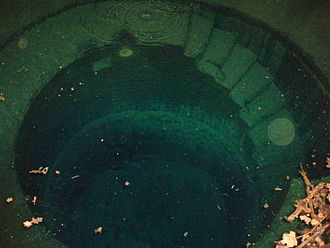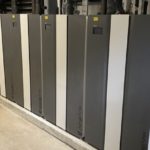Taff’s Well, Wales
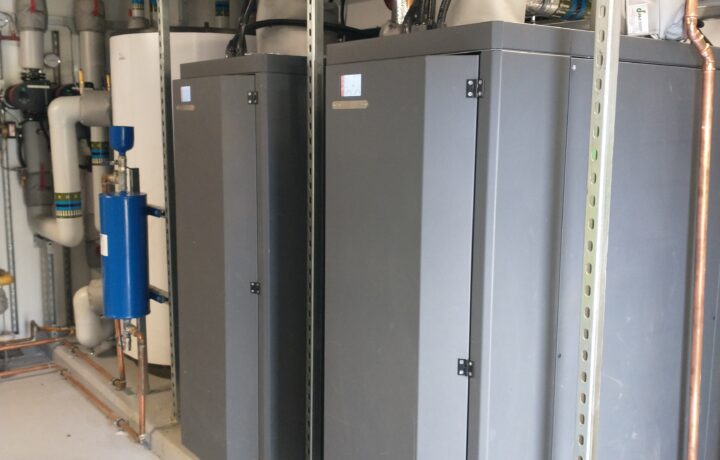
Taff’s Well, Wales
In a unique installation project for Kensa Contracting, the historic Taff’s Well – Wales’ only thermal spring – was used as a heat source for heat pump systems in Ffynnon Taf Primary School and the pavilion at Taff’s Well Bowling Club, near Cardiff. Kensa designed a complex but effective open loop water source system and oversaw innovative horizontal drilling solutions in the installation of the underground pipework.
Water source systems are highly efficient, as water has a higher heat transfer rate than the ground. The primary school benefitted from the high heat capabilities of Kensa’s Q heat pumps, whilst the bowls pavilion is heated by the efficient Kensa Evo.
A water source that has served the community for generations
Taff’s Well contains the only natural thermal spring in Wales – one of only three in the UK – the others being in Bath and Bedfordshire. It has an average water temperature of 21.6ᵒC – over 10ᵒC warmer than the average groundwater temperature of 11.3ᵒC in Wales. It is thought that the water has journeyed from limestone outcrops to the north of the village of Taff’s Well.
Over the years, various religious groups have regarded it as a spiritual site and it reached the height of its popularity in the last 1800s with visitors considering the water to have medicinal properties. After falling into disrepair during WW1, it re-opened with a small swimming pool in 1930, which unfortunately was ruined by flood waters in the 1950s.
Rhondda Cynon Taf County Borough Council redeveloped the site in the 1990s. The spring has been contained within a Grade II listed brick well structure and building, within Taff’s Well Park. As such, consent was required from Cadw – the historic environment service of the Welsh Government – for all works undertaken there.
Designing an open loop system to harness the spring
Rhondda Cynon Taf County Borough Council were keen to see the well utilised for a positive purpose for the local community. They were referred to Kensa, who saw the potential for harnessing heat from the thermal spring water to warm the local primary school and the nearby bowls pavilion.
Kensa designed an open loop system to harness the heat energy provided by the flow of warm water from the spring. Unlike traditional ground source or closed loop water source heat pump systems, that use pipework circulating a heat transfer fluid to harness the heat, in this case, water from the well is extracted via a pump and used directly within the system.
After the heat energy has been transferred to the heat pumps, the cooler water is then discharged through the well’s overflow which emerges several metres to the west of the spring, on the eastern bank of the River Taff. The well water never mixes with any other substance during the process and there is no issue with contamination or pollution. Due to the requirement for water extraction and reinjection, Kensa and the council secured appropriate licenses from Natural Resources Wales (NRW).
Open-loop systems require filtration and regular maintenance, which was considered and addressed by Kensa and the client. To avoid freezing the water where the transfer of energy occurs in the heat pump, Kensa used intermediate heat exchangers to separate the hot and cold circuits, protecting the components in the unit from the risk of corrosion.
Jill Bonetto, Rhondda-Cynon-Taf County Councillor, Taff’s Well Ward, said:
The system at Taff’s Well is providing a unique usage of the only thermal spring in Wales which combines the history of the Spring and the new technology of today’s era. As Chair of The Friends of Taff’s Well Park and Thermal Spring and the local County Councillor I welcome the innovative use of the waters of the well to heat both the school and the Park Pavilion. Using green energy is the way forward and Taff’s Well Ward welcomes and is supportive of the heat exchange project and pleased to have been involved in its conception.
Connecting the local primary school and bowls pavilion
Adding an extra level of complexity to the system design – Kensa added the school buildings and bowls pavilion onto a network of shared pipework, into which the warm water from the well is circulated. This shared ground loop array distributes warm water to the heat pumps installed in the separate buildings, avoiding the need for a central plantroom and giving each individual control over its own heating.
Kensa’s largest capacity heat pumps – The Q Series – were specified for the two school buildings – new and old – to satisfy the need for a large amount of heating and hot water to keep pupils and staff warm and comfortable. Kensa’s more compact but still highly efficient Evo heat pumps were supplied to heat the bowls pavilion and provide hot water.
The distance between the well house and the school is approximately 360m on a route filled with pipes for existing utility services and mature trees with large root beds. Trenching this route in the traditional way was nigh on impossible, so the pipes were horizontally drilled as an unusual solution.
Initially, the plan was to complete the majority of the work over the holiday periods, however, work on the new school extension caused a delay.
Matt Zealley, Sales Manager at Kensa Contracting, said:
The council was keen to utilise the well as it provides an unlimited amount of free renewable energy that was just flowing straight into the River Taff. The local school and bowls pavilion were the obvious beneficiaries of this system as they are located so close to the well.
The installation of the heat pump system in the well has not only relieved the school and pavilion of its gas dependency, it has reduced the carbon output from their heating systems by around 80%. With the heat pumps producing no emissions or pollution, this scheme will also have had a positive impact on the air quality for the pupils and the local community.


